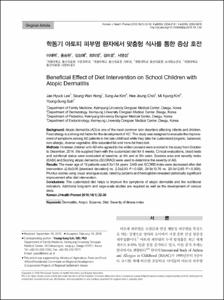학동기 아토피 피부염 환자에서 맞춤형 식사를 통한 증상 호전
- Keimyung Author(s)
- Kim, Sung Ae; Choi, Hee Joung; Kim, Mi Kyung; Suh, Young Sung
- Department
- Dept. of Dermatology (피부과학)
Dept. of Pediatrics (소아청소년학)
Dept. of Internal Medicine (내과학)
Dept. of Family Medicine (가정의학)
- Journal Title
- Korean Journal of Health Promotion
- Issued Date
- 2016
- Volume
- 16
- Issue
- 1
- Abstract
- Background: Atopic dermatitis (AD) is one of the most common skin disorders affecting infants and children.
Food allergy is a strong risk factor for the development of AD. This study was designed to evaluate the improvement
of symptoms among AD patients in the late childhood while they take the customized (organic, balanced,
non-allergic, diverse vegetable, little saturated fat and trans fat free) diet.
Methods: Nineteen children with AD who agreed to the written consent were enrolled in the study from October
to December, 2014. We supplied them with the customized diet for 8 weeks. Clinical evaluations, blood tests
and nutritional status were conducted at baseline, at 4th and at 8th week. Eczema area and severity index
(EASI) and Scoring atopic dermatitis (SCORAD) were used to determine the severity of AD.
Results: The mean age of 19 patients was 8.5±1.54 years. EASI and SCORD index were decreased after diet
intervention (2.6±3.06 [standard deviation] vs. 2.0±2.93 P=0.026, 24.9±10.76 vs. 20.0±12.65 P=0.009).
Pruritus scores using visual analogue scale, rated by patients and hemoglobin revealed statistically significant
improvement after diet intervention.
Conclusions: The customized diet helps to improve the symptoms of atopic dermatitis and the nutritional
indicators. Additional long-term and large-scale studies are required as well as the development of various
diets.
- Alternative Title
- Beneficial Effect of Diet Intervention on School Children with
Atopic Dermatitis
- Publisher
- School of Medicine
- Citation
- 이재혁 et al. (2016). 학동기 아토피 피부염 환자에서 맞춤형 식사를 통한 증상 호전. Korean Journal of Health Promotion, 16(1), 32–36. doi: 10.15384/kjhp.2016.16.1.32
- Type
- Article
- ISSN
- 2234-2141
- 파일 목록
-
-
Download
 oak-2016-0322.pdf
기타 데이터 / 369.47 kB / Adobe PDF
oak-2016-0322.pdf
기타 데이터 / 369.47 kB / Adobe PDF
-
Items in Repository are protected by copyright, with all rights reserved, unless otherwise indicated.